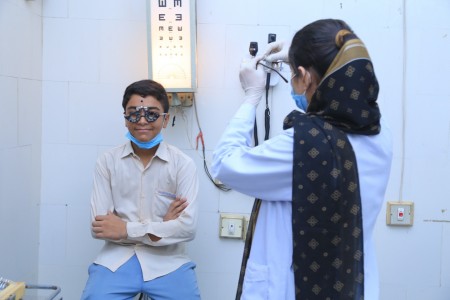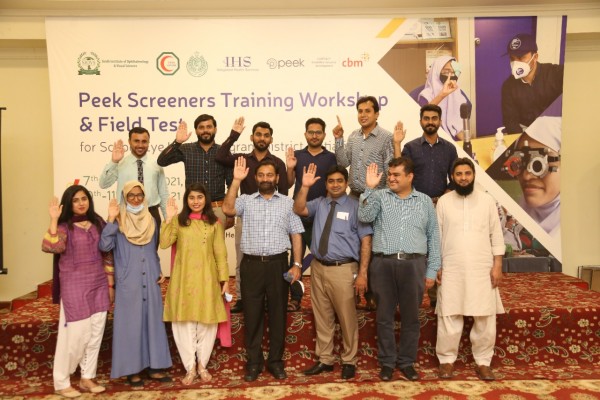
A boy has glasses fitted as part of the CBM-Peek School Eye Health programme in Matiari, Pakistan
Credit: Sindh Institute of Ophthalmology & Visual Sciences (SIOVS)
Thousands more children will be screened and connected to treatment in Pakistan as part of new and expanded School Eye Health programmes delivered through the CBM Christian Blind Mission and Peek Vision partnership. The programmes, supported by Pakistan’s National Committee for Eye Health, chaired by Professor Asad Aslam Khan, will reach an estimated 500 000 children in Sindh and Punjab provinces.
In Sindh province, the Sindh Institute of Ophthalmology & Visual Sciences (SIOVS) is implementing a new CBM-Peek School Eye Health programme. It integrates school screening into an existing Community Eye Health programme operating across Matiari district, and will cover more than 950 schools. The programme is supported by the Sindh Education and Literacy Department.
Professor Khalid Iqbal Talpur, Director of SIOVS, chaired a special event in June to launch the programme and performed a ribbon cutting ceremony. He shared with attendees that SIOVS hopes to scale the activities further to reach 1.6 million school children in 16 districts of Sindh province from 2021-2025 through CBM-Peek School Eye Health programmes.
In Punjab province, an established CBM-Peek School Eye Health programme, implemented by the College of Ophthalmology & Allied Vision Sciences (COAVS), is being scaled up to cover the entire Chakwal district (more than 1100 schools). Programme planning and training for Peek users has been completed and eye screening is due to start in the coming weeks.
Children in the school eye health programmes are screened with smartphones by personnel trained to use the Peek Capture app. In Punjab province, screening is done by School Health and Nutritional Supervisors, while in Sindh province it is carried out by a group of designated teachers. If children are identified as needing follow-up care, they are referred to triage at rural health centres and then connected with further services if required. The child’s parent or guardian receives personalised SMS reminders about follow-up appointments, and real-time data enables programme managers to monitor the patient journey to help ensure children are receiving the care they need.

Attendees at the launch event for the CBM-Peek School Eye Health programme in Matiari, Pakistan
Increasing impact
CBM first introduced Peek technology into Pakistan in 2018. Dr Zahid Awan, ophthalmologist and Inclusive Eye Health Project Manager for CBM in Pakistan, said: “Peek has helped us to transform how we manage eye health caseloads, greatly increasing access to eye care at local health centers and allowing hospital staff to focus on more complex cases.
“The programmes have shown impressive impact and have grown significantly in scale since 2018. In the initial pilot, Peek connected one Basic Health Unit, one Rural Health Centre and one Tehsil Headquarter Hospital (THQ). Today, Peek technology has so far connected 63 Basic Health Units, 10 Rural Health Centers, six THQ/District Hospitals and two specialised Tertiary Eye Hospitals. There are 79 Lady Health Visitors who are trained in Peek visual acuity screening across both districts.
“We’re aiming to continue to expand the reach of these programmes even further in the coming months and years.”
Since 2018, in total across the CBM-Peek programmes in Pakistan:
- More that 265 400 people have been screened, with 27% identified as needing further services and 73% found healthy
- 62 100 people (88% of those referred from screening) attended their follow-up appointment, at which 91% were confirmed with an eye or vision problem by the optometrist
- 86% of those referred had their eye health needs met at the primary level, with only 13% requiring further referral to the ophthalmologist at the secondary eye hospital, and 1% at the tertiary eye hospital
- 28 380 people have been prescribed glasses
Syed Ali Shah, Country Director for CBM Pakistan, said: “Peek is an exciting programme tool and it is certainly playing a vital role in strengthening primary eye care services. Furthermore, these programmes complement Pakistan’s National Integrated People-Centered Eye Care Plan 2020-2025.”
Sergio Latorre Arteaga, Peek’s Programme Management Lead for Pakistan, said: “We are very encouraged by what our partners are achieving in Pakistan. The success of the Community and School Eye Health programmes has demonstrated the potential for further replication and scale-up in the country.
“Integrating School Eye Health screening is an important step to ensure that school-going children also benefit from access to eye services. We’d like to congratulate our partners CBM, COAVS and SIOVS, as well as the National Committee for Eye Health, for their commitment in driving these programmes forward.”
Peek is currently powering programmes in partnership with CBM in multiple other countries in Africa and Asia, as well as with Vision for a Nation in Ghana.